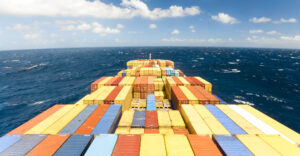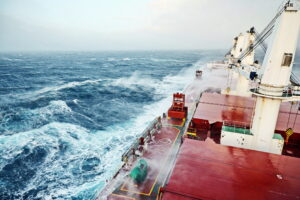Cyber, business interruption and natural catastrophes are the risks of most concern for businesses globally in the Allianz Risk Barometer 2025.
In the shipping sector, the cost of cyberattacks and demand for ransom payments across the sector have skyrocketed with the industry being an “easy target” for cybercriminals.
The maritime industry has made great progress in improving its approach to cyber risk management, but significant gaps remain.
Reports of vessels experiencing GPS interference and jamming, which can result in lost or inaccurate signals affecting navigation are increasing, particularly in hotspots such as the Strait of Hormuz, the Mediterranean and the Black Sea.
Vessels’ Automatic Identification Systems (AIS) can also be spoofed and are open to cyber-attack.
The Allianz Risk Barometer tracks the most important corporate concerns for the year ahead, as voted for by a record 3,778 risk management experts from 106 countries and territories.
Cyber incidents (38% of responses, a record 7% points ahead) consolidates its position as the most important risk.
The risk impact of new technologies and developments in artificial intelligence (AI) is a new entrant in the top 10 global risks at #10.
Closely interlinked to cyber, business interruption is ranked #2 (31%), just ahead of another related risk, natural catastrophes at #3 (29%).
Climate change is another standout result in 2025. It is the biggest mover in the top 10 risks globally, climbing two places to #5 (19%), achieving its highest ever position in the 14 years of the survey.
As climate- and nature-related risks continue to rise, the financial implications will become increasingly pronounced, whether it concerns managing climate change transition risk, mounting costs from regulatory compliance on disclosing physical climate risks or operational disruptions caused by more extreme weather events and ecosystem degradation.
Reflecting regulatory developments for sustainability and emerging technologies, changes in legislation and regulation (25%) also drew a bigger response this year, retaining #4 globally.
“What stands out in this year’s Allianz Risk Barometer is the interconnectivity of the top risks. A change in one – or indeed a mitigating action – might have a knock-on effect on another, and another. Climate change, emerging technology, regulation and geopolitical risks are increasingly intertwined, resulting in a complex network of cause and effect,” said Michael Bruch, global head of risk advisory services, Allianz Commercial.
In today’s volatile and interconnected risk environment, businesses need to adopt a holistic approach to risk management and consistently strive to enhance their resilience, Bruch added.
“Extreme weather events such as the devastating floods seen in Spain last year, increasing geopolitical conflicts, as well as cyber incidents like the CrowdStrike outage, demonstrate the need to continue building greater resilience. Resilience will be the key topic going forward.
“Humans often have short memories, quickly forgetting past events and maintaining unchanged behaviors. Despite some valuable lessons learned from the pandemic, which led many businesses to adopt resilience measures, I worry that current global events and the cost-of-living crisis might cause resilience to lose its priority. In truth, resilience is more crucial now than ever.”



